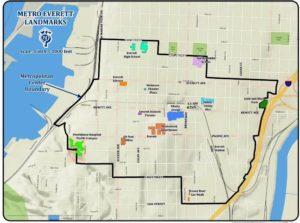The city council in March also decided no new clinics of any kind could be opened in the B-3 district that comprises the downtown Everett retail core for nine months while the Metro Everett plan was being finalized.
Right now the city council is in the middle of working on the final vision for the “Metro Everett” plan. In the second of four public hearings, the council Wednesday night is asking the public to weigh in on the options they have before them regarding clinics and social services. On July 31st council members received the following options from planners:
Option 1: Prohibit clinics and social services entirely within Metro Everett. This option adds “social services” to the prohibition on clinics that had been previously recommended to the Planning Commission. Clinics are currently prohibited in the interim ordinance anywhere in the B-3 zone. The Planning Commission has recommended allowing both uses anywhere in the Urban Mixed (UM) zone in Metro Everett.
Option 2: Prohibit clinics and social services on ground floor of Transit-Oriented Development (TOD) and Pedestrian Streets. This option would be consistent with other similar uses proposed to be prohibited on the ground floor of these streets, including: teen and private clubs, tattoo parlors, pawnshops, thrift stores, auto-dependent retail, commercial storage, veterinary clinics, food banks, religious facility and places of worship.
Option 3: Prohibit clinics and social services on ground floor throughout Metro Everett. This option would prohibit clinics and social services on the ground floor throughout Metro Everett.
Option 4: Prohibit clinics and social services on ground floor in Metro Everett in the UM zone if:
1) Size. A clinic or social service exceeds a gross floor area of more than 3,000 square feet on the ground floor.
2) Proximity. A clinic or social service is within five hundred (500) feet of another medical clinic or social service.
3) Patient Volume. A clinic or social service would have a daily patient or client volume of more than fifty (50) per day.
Regardless of whether the council chooses one of the four options shown above, or the planning commission recommendation, legal counsel has advised that we amend the definition of social service facility, which we have done and incorporated into the ordinance submitted to city council. (See language below.)
“Social service facility” means a facility housing a public or nonprofit agency that provides counseling, therapy or other social or human services to persons needing such service. This definition does not include schools, hospitals, clinics, day care, or residential uses.
Any restrictions would not apply to Governmental agencies like the Snohmish Health District which is looking for office space in the Metro Everett area or Snohomish County Government which is opening a resource center in the historic Carnegie building that will offer mental health treatment, substance use disorder treatment and other services.
Downtown Everett, Washington business owners have lobbied the council that there are more than their fair share of clinics and treatment services in the area to become Metro Everett and any more such services or clinics will adversely impact economic stability downtown.
The public hearing is part of the regular Everett City Council meeting which starts at 6:30 PM in council chambers at 3002 Wetmore in downtown Everett.





August 7, 2018
Everett Government